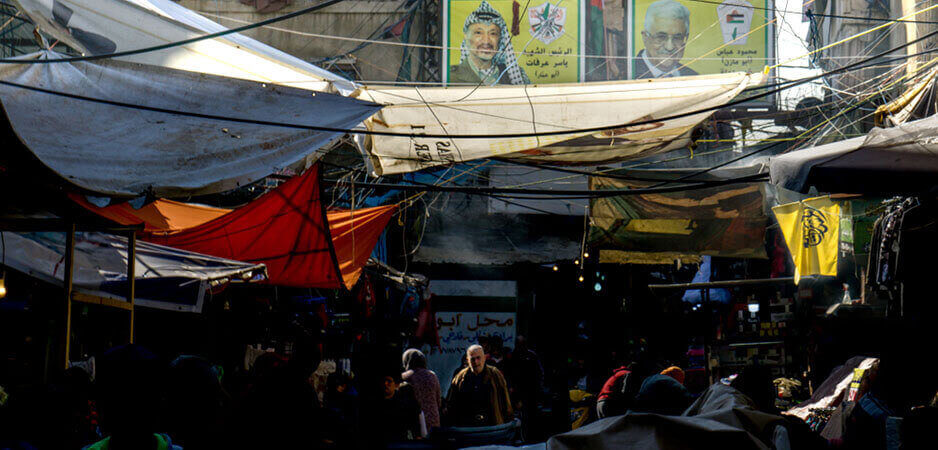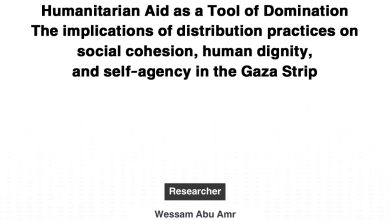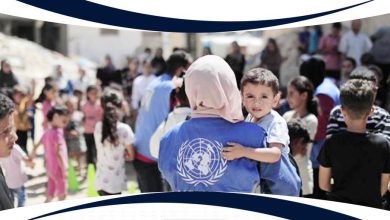Could Washington Dismantle UNRWA?

The Trump administration has a deeper and darker agenda than simply reviving peace talks between the Israelis and Palestinians.
On August 31, the Trump administration announced that it was suspending all financial support for the UN Relief and Works Agency for Palestine Refugees (UNRWA). In 2016, the US provided $368 million to UNRWA, meaning the agency has now been deprived of a third of its budget.
This marks a new catastrophic chapter in the Israeli-Palestinian conflict. It is yet another example of Israel and the US imposing “facts on the ground” to put an end to the Palestinian cause, especially when it comes to the status of Jerusalem and refugees. The drying up of UNRWA’s funds is a means to an end for Washington and Tel Aviv.
Some observers believe that America’s financial aid to UNRWA is a bribe to keep Palestinians dependent on international organizations. That is why the European Union is preparing to seek alternative funds for UNRWA, pointing out in a statement that the UN agency is “vital for stability and security” in the Middle East.
The Trump administration uses aid as a weapon. US officials have not hidden the fact that they want to have influence over the Palestinians and force them to accept the long-waited peace plan promised by President Donald Trump.
THE TRUMP PLAN
Behind these actions lies a deeper and darker agenda than the simple revival of failed negotiations between the Israelis and Palestinians. For the past 25 years, peace talks have provided cover for Israel‘s gradual takeover of what was supposed to be a future Palestinian state, with East Jerusalem as the capital. The Trump administration, however, has engineered a “peace process” based on a de facto situation created by Israel on the ground.
This has been done by targeting final status issues such as borders, the status of Jerusalem and Palestinian refugees for the benefit of the stronger side: Israel. The only obstacle is to find a way to put pressure on the Palestinians to accept a peace deal.
Israel has already moved its borders through multiple wars, evictions of Palestinians from their homes and the building of illegal Jewish settlements on Palestinian land. Since the wars of 1948 and 1967, Israel has been working to seize the rest of Palestinian territory, leaving little space in the West Bank due to settlements, while Gaza has been turned into a ghetto on a small coast.
In December 2017, the US declared Jerusalem as the capital of Israel and then moved the embassy from Tel Aviv to Jerusalem in May 2018, despite uproar from the Palestinians and the international community.
The third goal for the Trump administration is to end the right of return for Palestinian refugees. On September 4, US Ambassador to Israel David Friedman said that stopping UNRWA funding means the US has “slayed the sacred cow,” in reference to aid for refugees.
Over the course of peace talks, Israel has agreed to a symbolic return of a few thousand Palestinian refugees to what is today part of Israel and the return of other refugees to the future Palestinian state in the West Bank and Gaza. But if Israel refuses to recognize Palestine as a country, it will never allow refugees from Lebanon, Syria and Jordan to move to the West Bank and Gaza and become citizens of a Palestinian state.
DISMANTLE UNRWA
Israel and the US have an alternative solution, preferring to dismantle UNRWA and brush aside Palestinians in the growing tide of refugees caused by conflicts in Iraq, Syria, Libya and Afghanistan. Washington and Tel Aviv want Palestinian refugees to be under the responsibility of the UN Refugee Agency (UNHCR), or better placed under the responsibility of their host countries.
In August, Foreign Policy reported that Jared Kushner, the son-in-law of Donald Trump and his senior adviser, has been working to “do away” with UNRWA. The main aim in suspending the UN agency is to strip millions of Palestinians of their status as refugees. In doing so, these refugees would have to seek permanent resettlement in their host countries in return for substantial compensation for these nations. When UNRWA’s mandate is due to run out in two years, it seems certain that Washington will try to prevent its renewal. The mandate of UNRWA was last renewed by the UN General Assembly in 2016.
For the US and Israel, it’s simple: If there is no UNRWA, there is no problem of Palestinian refugees. If there are no refugees, there is no right of return and there will be less pressure for the establishment of a Palestinian state. This indicates that UNRWA and refugees have been used politically to change the form of solutions to the Palestinian issue.
PALESTINIAN DIVISION
For Palestinians, a sense of anxiety and anger reigns over the people and their leadership following the US move to stop funding UNRWA. Refugees are clearly worried about the impact on their living conditions in camps.
Trump’s decision is tantamount to creating a financial and political crisis aimed at eliminating UNRWA, which is the main part of UN Resolution 194 that calls for the right of Palestinian refugees to return to their homes that were lost in 1948. Considering the return of all refugees is unlikely, UNRWA is realistically the only remaining element of the resolution. This is why the Americans and Israelis want to abolish UNRWA and undermine the Palestinian cause.
Meanwhile, the Arab League condemned the US decision to stop the financing of UNRWA — which was formed by a UN resolution that represents the position of the international community — and considered the move to be contrary to international law.
The US decision has come under Palestinian division and faltering efforts at reconciliation between Fatah and Hamas. It also occurred when Hamas announced that it favors a truce with the occupation in place, rather than going ahead with Palestinian reconciliation.
This may push some Palestinian factions to accept humanitarian solutions in accordance with the Trump plan. This would probably require the Palestinians to make concessions for the established of a state, even more than what was required after the 1993 Oslo Agreement in return for economic gains, self-rule and humanitarian aid.
If UNRWA is dismantled, it would open the door for the separation of the Gaza Strip and the West Bank. This would effectively contain a Palestinian state in Gaza alone, while maintaining the occupation in the West Bank and East Jerusalem, with some sort of autonomy for Palestinians. This eliminates the idea of establishing a Palestinian state on the 1967 borders and undermines the unity, destiny and representation of Palestinian people.
Externally, such a move to shut down UNRWA would constitute a political, economic and social challenge for those countries surrounding Israel in terms of dealing with those who have been stripped of refugee status. The countries hosting these Palestinian refugees, including Lebanon, Jordan and Syria, fear this action and its repercussions. Jordanian Foreign Minister Ayman Safadi has warned that stopping aid to UNRWA “will only consolidate an environment of despair that would ultimately create fertile grounds for further tension.”
Indeed, this is a catastrophic chapter in the conflict.




